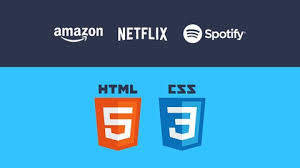Building a Netflix clone is an excellent project for mastering the fundamentals of HTML and CSS. It allows you to work on real-world concepts like responsive design, grid layouts, and styling techniques. In this tutorial, we’ll walk you through the process of creating a simple Netflix-inspired webpage, helping you refine your front-end development skills and visit fsiblog.
Why Build a Netflix Clone?
- Learn Layout Techniques: Understand how to use flexbox, grid, and positioning to create professional layouts.
- Responsive Design: Gain experience in making your webpage adaptable to various screen sizes.
- Hands-On Practice: Enhance your coding skills by replicating a popular website.
- Portfolio Project: Add a polished project to your portfolio, showcasing your ability to recreate modern designs.
Project Setup
Tools Needed:
- A code editor (e.g., Visual Studio Code).
- A modern web browser (e.g., Google Chrome).
- Basic knowledge of HTML and CSS.
Folder Structure:
Create a project folder named netflix-clone and include the following files:
index.htmlstyle.css- An
imagesfolder for assets like logos and thumbnails.
Step 1: Setting Up the HTML Structure
Start by creating the basic structure for your Netflix clone in index.html:
htmlCopy code<!DOCTYPE html>
<html lang="en">
<head>
<meta charset="UTF-8">
<meta name="viewport" content="width=device-width, initial-scale=1.0">
<title>Netflix Clone</title>
<link rel="stylesheet" href="style.css">
</head>
<body>
<header>
<div class="logo">
<img src="images/netflix-logo.png" alt="Netflix Logo">
</div>
<nav>
<ul>
<li><a href="#">Home</a></li>
<li><a href="#">TV Shows</a></li>
<li><a href="#">Movies</a></li>
<li><a href="#">New & Popular</a></li>
<li><a href="#">My List</a></li>
</ul>
</nav>
</header>
<section class="hero">
<h1>Unlimited movies, TV shows, and more.</h1>
<p>Watch anywhere. Cancel anytime.</p>
<button>Get Started</button>
</section>
<section class="content">
<h2>Popular on Netflix</h2>
<div class="row">
<div class="card"><img src="images/show1.jpg" alt="Show 1"></div>
<div class="card"><img src="images/show2.jpg" alt="Show 2"></div>
<div class="card"><img src="images/show3.jpg" alt="Show 3"></div>
</div>
</section>
<footer>
<p>© 2024 Netflix Clone. All rights reserved.</p>
</footer>
</body>
</html>
Step 2: Styling the Clone with CSS
Create styles for your Netflix clone in style.css:
General Reset:
cssCopy code* {
margin: 0;
padding: 0;
box-sizing: border-box;
}
body {
font-family: Arial, sans-serif;
background-color: #141414;
color: white;
line-height: 1.6;
}
Header Styling:
cssCopy codeheader {
display: flex;
justify-content: space-between;
align-items: center;
padding: 10px 20px;
background-color: #141414;
position: fixed;
width: 100%;
z-index: 1000;
}
.logo img {
height: 40px;
}
nav ul {
list-style: none;
display: flex;
gap: 20px;
}
nav ul li a {
text-decoration: none;
color: white;
font-weight: bold;
transition: color 0.3s ease;
}
nav ul li a:hover {
color: #e50914;
}
Hero Section Styling:
cssCopy code.hero {
height: 80vh;
background: url('images/hero-bg.jpg') no-repeat center center/cover;
display: flex;
flex-direction: column;
justify-content: center;
align-items: center;
text-align: center;
padding: 0 20px;
}
.hero h1 {
font-size: 3rem;
margin-bottom: 10px;
}
.hero p {
font-size: 1.5rem;
margin-bottom: 20px;
}
.hero button {
padding: 10px 20px;
font-size: 1rem;
background-color: #e50914;
color: white;
border: none;
border-radius: 5px;
cursor: pointer;
transition: background-color 0.3s ease;
}
.hero button:hover {
background-color: #b20710;
}
Content Section Styling:
cssCopy code.content {
padding: 50px 20px;
}
.content h2 {
font-size: 2rem;
margin-bottom: 20px;
text-align: center;
}
.row {
display: flex;
gap: 20px;
justify-content: center;
}
.card {
width: 150px;
height: 225px;
overflow: hidden;
border-radius: 10px;
transition: transform 0.3s ease;
}
.card img {
width: 100%;
height: 100%;
object-fit: cover;
}
.card:hover {
transform: scale(1.1);
}
Footer Styling:
cssCopy codefooter {
text-align: center;
padding: 20px;
background-color: #141414;
border-top: 1px solid #333;
font-size: 0.9rem;
}
Step 3: Adding Responsive Design
Ensure your Netflix clone looks great on all devices using media queries:
cssCopy code@media (max-width: 768px) {
.hero h1 {
font-size: 2rem;
}
.hero p {
font-size: 1rem;
}
.card {
width: 120px;
height: 180px;
}
}
Step 4: Enhance the Design (Optional)
Add Hover Effects:
Use hover animations for buttons and images to make the design more interactive.
cssCopy codebutton:hover {
transform: scale(1.05);
}
.card:hover {
box-shadow: 0 4px 8px rgba(255, 255, 255, 0.2);
}
Include Additional Sections:
Add more sections like “Trending Now” or “Top Picks for You” by reusing the content layout.
Step 5: Test Your Design
- Open
index.htmlin a browser. - Test the layout and responsiveness by resizing the browser window.
- Check for any broken links or images.
Conclusion
By following this guide, you’ve built a basic Netflix clone using HTML and CSS. This project demonstrates your ability to recreate professional designs while reinforcing essential front-end skills. You can expand this project further by:
- Adding JavaScript for dynamic interactions.
- Implementing a backend to fetch real data.
- Integrating authentication for a complete experience.



